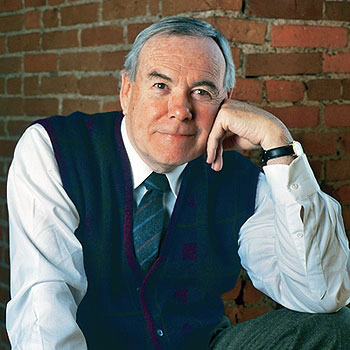
The Dean's List is a gentle satire that hinges on the witty, tolerant voice of the narrator, Leland Edwards, who describes himself as Dean “by default” of tiny Rookery State College. A lifelong resident of Rookery, Leland captivates us with his easy-going, unhysterical, accepting view of a group of eccentric small-town characters, among them his canny ex-wife, Sally, an administrator at the Hi-Rise, an apartment house inhabited by flamboyant senior citizens; his vivacious mother, who has her own radio show and loves bossing him around (he lives with her); L. P. Connor, a bitter, psychotic woman who is suing Leland for sexual harassment because he hugged a depressed student good-bye when she confided she was dropping out of school (and who has no complaint); and an obnoxious poet who shows up two months before the speaking engagement on which Leland pins his hopes for the salvation of Rookery College.
The problems at Rookery are manifold: declining enrollment, an unscrupulous hockey coach, an education professor who is having a nervous breakdown, and an illiterate president, O. F. Zastrow, who reads James Thurber as non-fiction and can't communicate.
And being the world’s worst communicator isn’t Zastrow’s only failing. He’s pitifully unaware of the world around him. Take Paul Bunyan, for example. Years ago, when “Paul Bunyan’s Alma Mater” became our official and ill-advised motto, Zastrow, then Dean, didn’t know Paul Bunyan was a mythical character. We had a brassy speech professor here at the time - her name was georgina Gold - who spoke up one day at a faculty meeting and suggested that Paul Bunyan be asked back to his alma mater as our commencement speaker. There were a few chuckles at first, but then we all held our breath when we saw the unmistakable signs that Dean Zastrow was thinking it over - his right eye narrowed, his lips tightened - and sure enough, he told us -confirming our awful suspicions - that he’d have his secretary inquire about Mr. Bunyan’s fee. He said we shouldn’t get our hopes up because celebrities charged a lot of money.
This is typical of Hassler’s tone. Occasionally, when he’s not being funny, Leland’s memories of his boyhood border on the sentimental. I don’t like my books sweet, and we get a little too much of that here - but on the other hand so did we in Richard Russo’s Bridge of Sighs. This is a humorous depiction of small-town life. Probably not for everybody, but it’s fun.
No comments:
Post a Comment